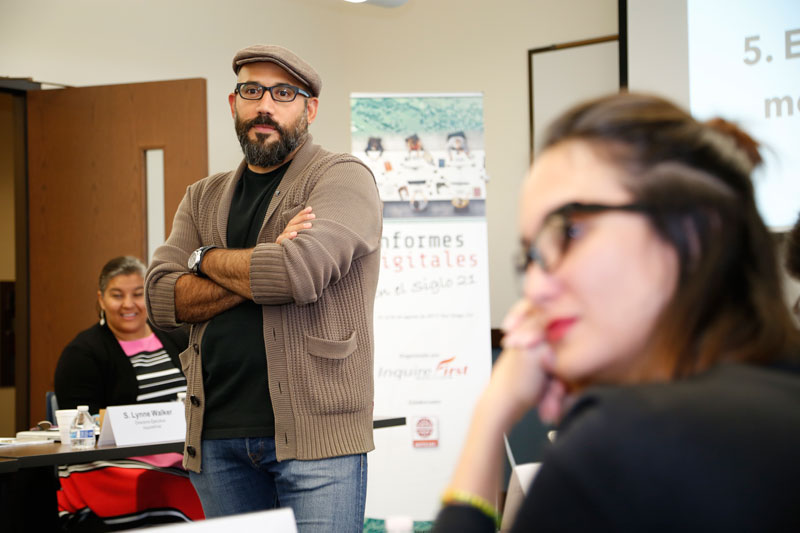
Digital Storytelling: Latin American journalists learn to take the lead in an ever-changing reporting environment
SAN DIEGO — The future of journalism lies in being able to tell stories visually.
“If your intention is to be a leader you have to think of new ways to tell your stories,” Raghu Vadarevu, Editor of Digital Storytelling/Global Enterprise for The Associated Press, told journalists from Latin America and the Caribbean who attended an Aug. 21-25, 2017, workshop organized and directed by InquireFirst on Digital Storytelling. “We can’t lose site of this: we’re still trying to tell stories. We just have to use all the new tools at our disposal to do that.”
During an intensive session with Vadarevu, journalist participants learned about cutting edge approaches to telling their stories online. Vadarevu talked about using new techniques such as cartoons to tell a complex news story. He described how The Associated Press used illustrations to tell the story of a girl who ran away from ISIS, detailing her treacherous journey with beautiful and moving drawings.
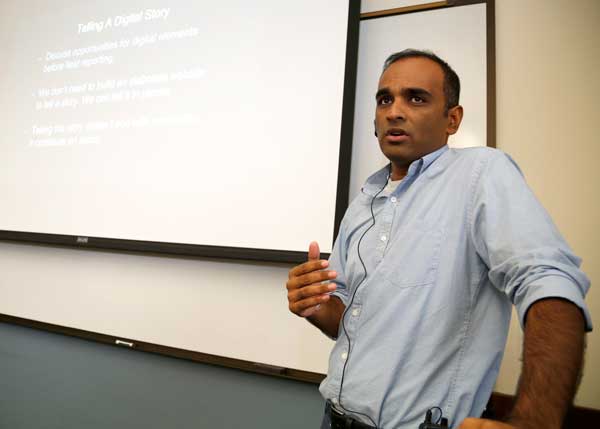
“You need to learn to communicate with people who can produce the visuals,” he said.
Vadarevu walked journalists through the steps for telling a digital story.
Discuss opportunities for digital elements before field reporting, he said. And remember that “we don’t need an elaborate website to tell a story. We’re gearing a lot of our content to the mobile experience. We can tell it in pieces on social media,” Vadarevu said.
He reminded journalists that “telling a story doesn’t end with publication. It continues on social media. With social media, there’s a lot more opportunity to engage with readers and users.”
The workshop, organized by InquireFirst Executive Director Lynne Walker and held on the University of San Diego campus, provided journalist participants with tools and techniques for reporting on multiple platforms as well as financing methods and organizational advice for their online media organizations. Journalists attended the program from México, Honduras, Bolivia, Ecuador and Cuba.
Robert Hernández, InquireFirst board member and USC Annenberg professor of professional practice, demonstrated low-cost and no-cost apps that journalists can use to tell their stories more effectively and deliver them to audiences real-time. But Hernández reminded the journalists of the “rules of the road: journalism first, technology second. We always follow our ethics. Social media does not replace good journalism.”
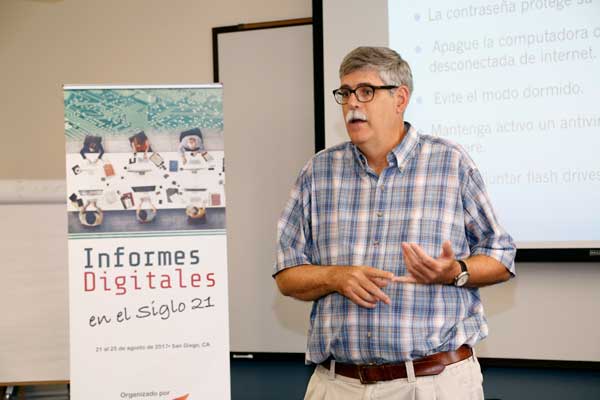
Walter Baranger, a journalism professor at California State University, Fullerton, and former senior editor of news operations at The New York Times, spoke with journalists about cyber security and measures that reporters and photojournalists can take to protect their work and their equipment from private and state-sponsored hackers.
Janine Warner, co-founder of SembraMedia, reviewed effective strategies for economic sustainability of online news organizations. She cited her recently completed study, Inflection Point, that showed that Latin America’s online organizations are strong and expanding.
There are more than 600 online news organizations now operating in Latin America and Spain, Warner said, and 49 percent of those news organizations have been operating for more than four years, a clear sign of sustainability. About 66 percent of those organizations had four or more sources of funding, demonstrating a diversity of funding sources which is key to economic stability.
The Digital Storytelling workshop organized by InquireFirst served to strengthen the resolve of journalists to launch or expand online news organizations, which are an effective means of reaching the population – especially young people – and delivering credible, precise, thorough reporting on the important events taking place in their countries.
At the conclusion of the workshop one journalist wrote, “I am leaving with a new idea to start my own online news site.” Another said, “You can be sure that everything I learned will be shared with others to improve the information we provide to our audiences.”
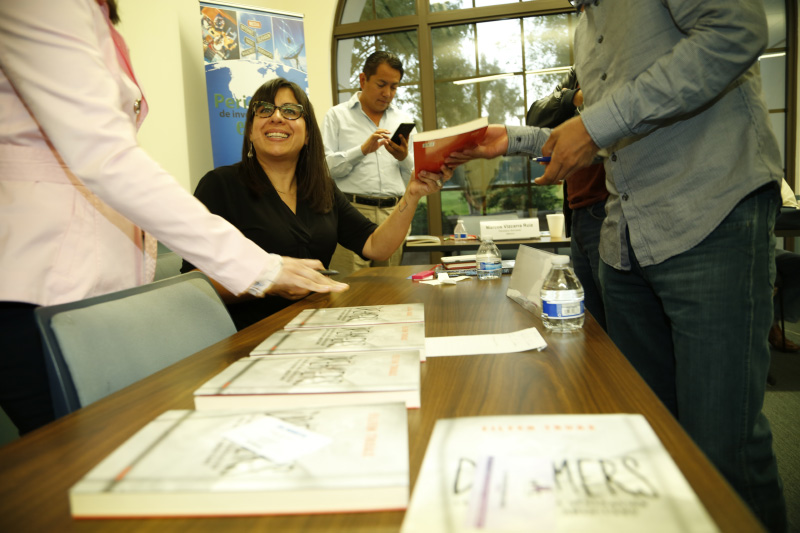
19 Latin American journalists attend inaugural InquireFirst symposium
SAN DIEGO — Journalists from Mexico, Venezuela, Bolivia, Nicaragua and Panama, attended InquireFirst’s inaugural international investigative journalism symposium Nov. 14-18, 2016, in San Diego. The program, organized and directed by InquireFirst Executive Director S. Lynne Walker and conducted entirely in Spanish, focused on investigative journalism in the digital age.
Nineteen Latin American journalists met with prestigious U.S. journalists and professors who offered in-depth instruction on digital reporting, data reporting and visualization of data, video reporting and economic models for conducting investigative reporting on a limited budget.
A panel discussion with Susan White, executive director of InquireFirst who has edited three Pulitzer Prize-winning projects at three U.S. media organizations, focused on techniques for reporting and writing a prize-winning investigative project. White was joined on the panel by Dave Hasemyer, an investigative reporter for InsideClimateNews who is a winner of the 2013 Pulitzer Prize and a finalist for the 2016 Pulitzer Prize.
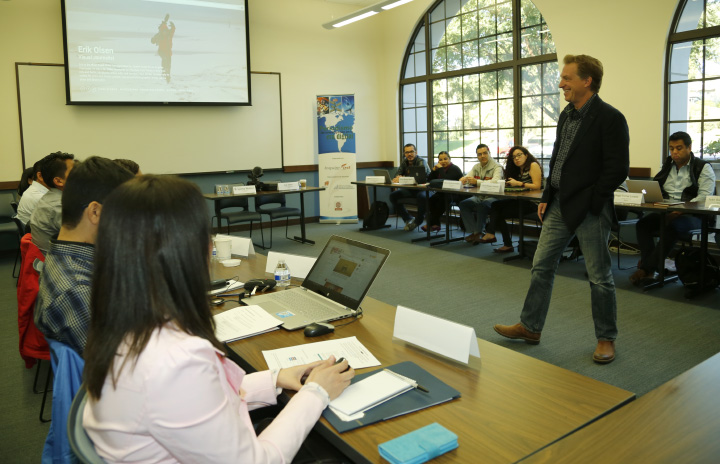
Robert Hernandez, associate professor of professional practice at the University of Southern California and InquireFirst board member, instructed a three-hour workshop on digital journalism and low-cost and no-cost digital tools available to journalists to enhance their reporting and website presentation. Erik Olsen, West Coast video correspondent for Quartz and former senior video journalist for The New York Times, talked about techniques and equipment for producing visual news reports.
Danielle Cervantes, InquireFirst journalist and professor of investigative data journalism at Point Loma University in San Diego, taught a workshop on data research.
Eileen Truax, InquireFirst journalist and author of Dreamers, An Immigrant Generation’s Fight for Their American Dream, spoke with journalists about ways to conduct investigative journalism with limited resources.
Walker taught a half-day session that provided journalists with practical techniques to gain access to credible and confirmed information when official channels to information are blocked. This interactive session encouraged journalists to stretch beyond the typical search for news sources and to think analytically about ways to conduct investigations without putting their lives at risk.

During the workshop, journalists met in Tijuana with Adela Navarro, co-publisher of the weekly newspaper Zeta, and her investigative team to discuss freedom of expression and the risks and responsibilities of reporting in dangerous conditions. They discussed border issues with San Diego State University Professor Victor Clark Alfaro, director of an independent center in Tijuana, the Bi-National Center for Human Rights. And they spoke about public security issues with Vicente Calderon, founder of the online news site TijuanaPress.com and editorial coordinator of Newsweek Baja California.
The journalists also engaged in a discussion with four regional experts on post-electoral implications for issues such as immigration, the bi-national relationship and the U.S.-Mexico border.
As a result of the InquireFirst symposium, journalists proposed several projects for reporters and editors in their own cities as well as for university journalism students, creating a multiplier effect for the training provided during the program. Their intent is to ensure that the experience and knowledge they gained extends beyond the confines of the San Diego classroom and into newsrooms and journalism organizations throughout Latin America.
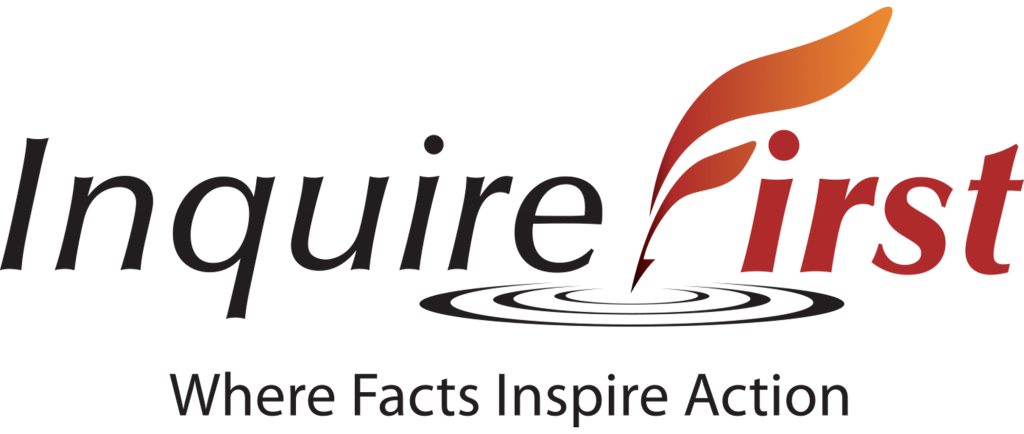




InquireFirst board member and health care expert Rosemary Gibson engaged in an in-depth interview on the Ralph Nader Radio Hour about her recently published book, “China Rx: Exposing the Risks of America’s Dependence on China for Medicine.”
Radio host Ralph Nader said Gibson’s meticulously researched book outlines how U.S. dependence on China for medications represents “a clear and present danger to the American people.”
“Our listeners should be notified that this is going to alarm them,” Nader said when introducing Gibson’s work to his audience. “Right now, more and more of the medicines in our country
are imported from China and India.
“You argue very convincingly, Rosemary, that there’s a national security problem here,” Nader told Gibson. “And secondly, to put it mildly, the inspection level by the FDA of these labs in Chinais non-existent, confused or very rare.”
Building Science Journalism Networks Around the World
Enrique Bustamante, director of Mexico City-based Fundación Ealy Ortiz and InquireFirst media partner, challenged science journalists across the globe to build networks to strengthen reporting on science, health, technology and the environment.
Bustamante issued the challenge during a keynote address at the opening ceremony of the 2017 World Conference of Science Journalists in San Francisco, California.
Fake News and the Future of Journalism
Robert Hernandez, InquireFirst board member and journalism professor at the USC Annenberg School for Communication and Journalism, talks about the challenges journalists face in this troubling new environment of fake news.
During his TedXTalk, Hernandez underscores the need for credible, accurate reporting.
What the Humanities Mean to a Journalist — and to the Future of Journalism
California Humanities, a non-profit that promotes the humanities, asked 40 notable Californians, including InquireFirst advisor Richard Louv, to write about the traditional yet tenuous relationship between the humanities and journalism. Here is his essay.
By Richard Louv
During my lifetime, the humanities and journalism have been interdependent, each improving and nourishing the other. The future of that relationship is not guaranteed.
I write nonfiction books. For three decades, I worked as a newspaper and magazine reporter and columnist. Most journalists my age, certainly those who earned their degree from Kansas University’s William Allen White School of Journalism, which I attended, were marinated in one particular idea, and it wasn’t objectivity. The idea was fairness. That idea was nurtured in our journalism classes, but even more through a liberal arts education, which gave us a broader understanding of human beings.
Most young journalism students of my era attended schools with strong liberal arts programs. We were steeped in the humanities, the study of how human beings process, document and communicate the human experience: history, literature, language, the arts, philosophy, civil discourse and civil society. Traditional journalism’s fundamental formulas were grounded in the humanities, which required us to step into the shoes of people from other times and cultures, people who did not look or talk like us, people with starkly different points of view. By putting us in those other shoes, the humanities encouraged a sense of fairness, which is the practical application of empathy.
To be fair requires us to acknowledge our bias, and everyone has more than one. To be fair means seeking out multiple and disparate views from people who deserve a dignified hearing. To be fair does not mean reducing every story to two sides. Being fair is not about point/counterpoint, which is what now passes for fair and balanced. More often than not, every issue has three, four, ten sides. To be fair means to reasonably include as many of them as possible. To that mantra, some of us added another qualification: To be fair goes beyond reporting problems; it requires exploring possible solutions, drawn from as many perspectives as possible.
Most journalists tried their best to follow this humanities-based code of conduct. That code was enforced from above and self-policed within the community of journalism. Sometimes harshly. Not one of us was perfectly fair, but we knew that fairness was the standard. In newsrooms, this standard of fairness was protected by understood firewalls that existed between departments of news, opinion and advertising.
From the late 1960s through the 1990s, the journalism code of fairness remained strong — probably stronger than it had ever been. Then came the growing power of the Internet, shrinking budgets, economic contraction. The walls came tumbling down.
Today, the desire for real journalism has been replaced by the desire for likes and tweets. Few news outlets retain adequate budgets for in-depth or investigative reporting. The ranks of courthouse, statehouse and foreign correspondence are decimated. Into an information swamp flow Internet trolls, purposeful disinformation, and, on TV, panels of paid political surrogates. Most media outlets are neither liberal nor conservative. They’re opportunistic. They produce and reflect a culture of unfairness and intolerance, where lies are welcomed as entertainment.
Foundation-supported journalism is trying to replace what we have lost through demise of newspapers and other producers of long-form journalism, but it remains underfunded. Good online journalism does exist but few notice it. Meanwhile, the newly dominant culture of unfairness and intolerance threatens not only responsible journalism, but the future of our justice system, education, and our political and social democracy.
Ironically, one of the few protections we have from the final dominance of that culture is the survival of the humanities, our endangered source of fairness. If truth has a future in America, we must support the humanities and a renaissance of good journalism, in all its forms.
Richard Louv is the author of nine books, including ‘Last Child in the Woods’ and ‘The Nature Principle’. He is chairman emeritus of the Children & Nature Network, and an advisor to InquireFirst, a not-for-profit news organization.